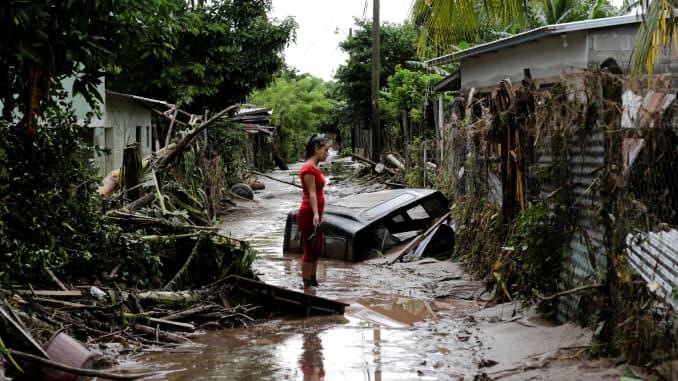PUBLISHED THU, JAN 7 2021
Emma Newburger@EMMA_NEWBURGER
A record number of hurricanes, wildfires and floods exacerbated by climate change cost the world $210 billion in damage last year, a top insurer said.
The six costliest disasters of 2020 occurred in the U.S., topped by Hurricane Laura’s devastation, which caused $13 billion in damage after hitting Louisiana in August.
One major problem the report revealed is the lack of insurance coverage for disasters in developing countries.
Overall disaster losses in Asia totaled $67 billion, of which only $3 billion was insured.

A woman stands outside her home damaged due to heavy rain caused by Hurricane Eta, in Pimienta, Honduras November 6, 2020.
Jorge Cabrera | Reuters
A record number of hurricanes, wildfires and floods exacerbated by climate change cost the world $210 billion in damage last year, according to a report by reinsurance company Munich Re.
Damages totaled $95 billion in the U.S., nearly double the losses in 2019. The country experienced a record number of Atlantic hurricanes and the largest wildfires on record in California in 2020, the second-hottest year on record.
Climate change is causing more frequent and intense disasters like storms, heat waves and wildfires, and economic losses are also growing as more people build in disaster-prone areas.
“Natural catastrophe losses in 2020 were significantly higher than in the previous year,” Munich Re board member Torsten Jeworrek said in the report. “Climate change will play an increasing role in all of these hazards. It is time to act.”
More from CNBC Environment:
A historic Atlantic hurricane season is ending. A look at the records it shattered
‘I lost everything’: In hurricane-ravaged Louisiana, people struggle to rebuild
Heat waves are becoming more deadly as nights warm faster than days
The six costliest disasters of 2020 occurred in the U.S, the worst of which was Hurricane Laura. The storm caused $13 billion in damage after it devastated parts of Louisiana in August. The Atlantic hurricane season saw a record 30 named storms and accounted for $43 billion in losses, almost half of the total disaster loss in the U.S. last year, the report said.
A line of severe thunderstorms in the Midwest in August caused $6.8 billion in losses and destroyed millions of acres of farmland in Iowa. Drought in the West also fueled dozens of massive wildfires that resulted in $16 billion in losses.
One major problem the report revealed is the lack of insurance coverage for disasters in developing countries. Overall disaster losses in Asia totaled $67 billion, of which only $3 billion was insured.
The single worst disaster last year was flooding across China from summer monsoons, which amounted to $17 billion in damage, of which only 2% was insured. Cyclone Amphan hit India and Bangladesh in May, causing $14 billion in damage, very little of which was insured, the report said.



















